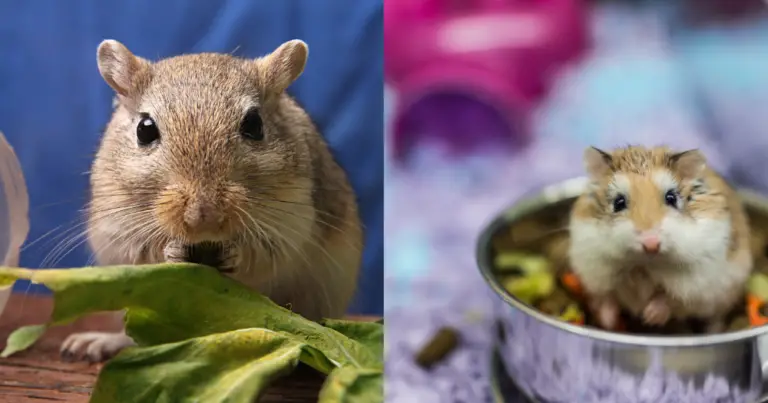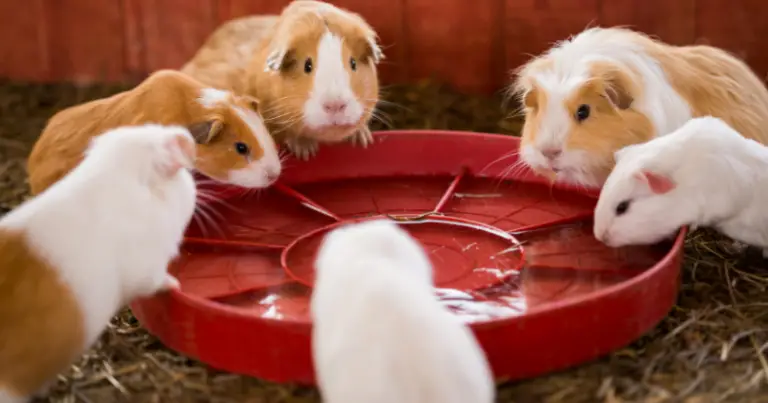Can Guinea Pigs Eat Marigolds? Debunking the Myth
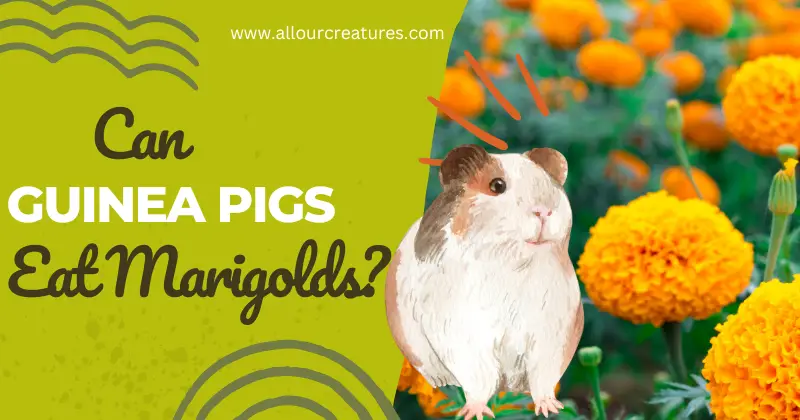
Guinea pig owners always want to ensure their pets have a balanced diet that keeps them happy and healthy. One question about feeding these adorable animals may arise is, “Can guinea pigs eat marigolds.” The Marigold flower is a vibrant, yellow-orange flower commonly found in gardens, but do these edible flowers benefit our little furry friends?
It turns out that guinea pigs can safely enjoy marigolds as an occasional snack. These flowers can provide some nutrients and health benefits to guinea pigs, but they should be consumed in moderation. As such, it’s important to introduce marigolds in small amounts and always monitor your pet’s reaction to any new food item.
Contents
Can Guinea Pigs Eat Marigolds?
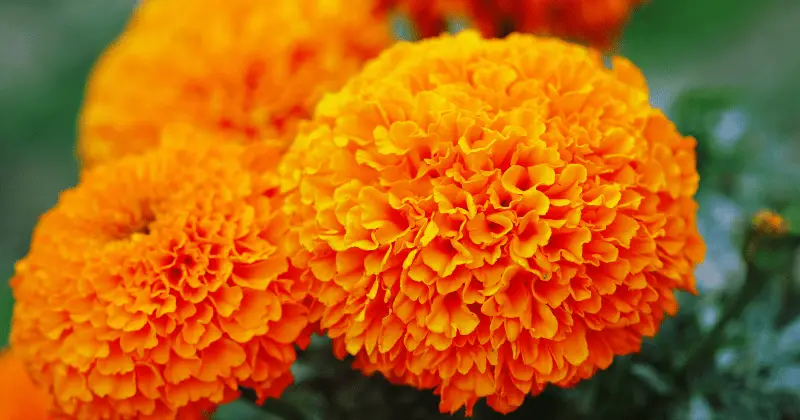
Yes, this is a safe flower, and guinea pigs can eat marigolds. It is important to consider a few factors, such as understanding which parts of the plant are safe for consumption and being aware of potential risks. This section will cover edible varieties, risks, and toxicity to help you make an informed decision.
Edible Varieties
Guinea pigs can consume marigold leaves, which are known to be nutritious for them. They can be fed fresh or combined with hay for increased nutrients. Marigold blossoms can also be offered to your guinea pigs as an occasional snack, but not on a regular basis. Just make sure to feed them in moderation, which can be once or twice a week to prevent any tummy aches.
The leaves and flowers of marigolds can be safely consumed by guinea pigs, but it is always crucial to ensure they are clean and free from chemicals before feeding them to your pets. To achieve this, rinse the plants with water to remove any potential pesticides or fertilizers.
Risks and Toxicity
Although marigold plants are generally safe for guinea pigs to consume, there are some risks and potential toxicity issues that you should be aware of.
-
- The stem of the marigold plant can be tougher and potentially harder for guinea pigs to chew and digest properly.
-
- There is a slight chance that marigold can cause an upset stomach for guinea pigs, especially if it’s their first time consuming the flower.
-
- Ensure to always monitor your guinea pigs when introducing new foods into their diet, especially when it comes to plants like marigolds.
-
- Remember to provide these flowers and leaves to your guinea pigs in moderation to avoid any potential health issues.
Overall, marigolds are safe for guinea pigs to consume as a snack or treat. Just be sure to provide the leaves and blossoms in moderation and always monitor your pets for any signs of stomach upset or other health issues.
Health Benefits of Marigolds for Guinea Pigs

Antioxidants
Marigolds are rich in antioxidants, which are essential for guinea pigs’ overall health. Antioxidants help prevent cell damage in the body caused by free radicals. These molecules may come from the food that guinea pigs eat, cigarette smoke, and even radiation.
By including marigolds in their diet, guinea pigs can benefit from the protective properties of antioxidants.
Vitamins and Minerals
Marigolds also contain essential vitamins and minerals, like vitamin C and vitamin A. Guinea pigs require vitamin C from their diet, as they cannot synthesize it on their own. Vitamin C is crucial for maintaining a healthy immune system, while vitamin A plays a vital role in maintaining good vision and skin health. Including marigolds in their diet can help guinea pigs meet their vitamin needs and stay healthy.
-
- Vitamin C: Essential for a healthy immune system
-
- Vitamin A: Supports good vision and skin health
Digestive Health
Marigolds are naturally high in fiber, which is important for guinea pigs’ digestive health. Fiber helps digestion and prevents constipation, ensuring your guinea pig maintains a healthy gastrointestinal system. Including marigolds in their diet can promote regular bowel movements and overall digestive well-being.
To summarize, incorporating marigolds into a guinea pig’s diet can provide several health benefits. These include antioxidants for overall health, essential vitamins like vitamin C and vitamin A for immune support and eye health, and fiber for proper digestion.
Feeding Marigolds to Your Guinea Pig
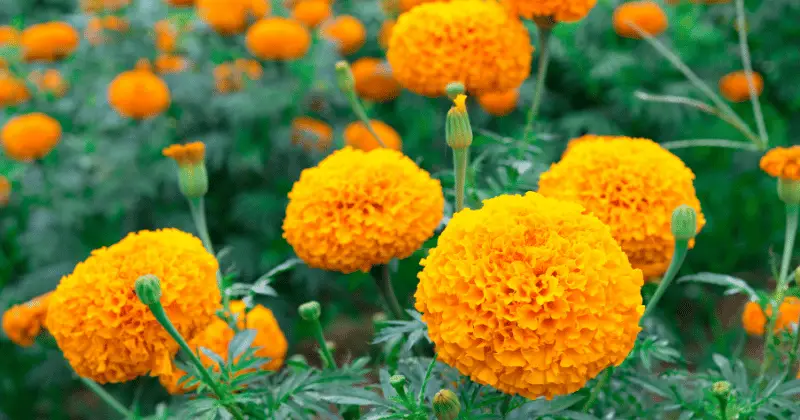
Guinea pigs can eat marigolds as an occasional treat. These flowers are safe and can provide some nutritional benefits when fed in moderation.
In this section, we will discuss portion control and preparation tips for feeding marigolds to your guinea pigs.
Portion Control
Marigolds should be given to guinea pigs in small amounts and only occasionally. Adult guinea pigs can be offered one or two large marigolds, or two to three small marigolds. It is important to avoid giving marigolds to young guinea pigs, as their dietary needs may be different.
Remember, marigolds should only make up a limited part of your guinea pig’s diet since they do not offer enough nutrients to meet their dietary requirements.
Feeding marigolds in moderation will help prevent any potential gut issues and ensure your guinea pig receives a balanced diet with proper nutrition from other sources. To maintain variety, you can alternate marigolds with other safe plants and flowers for your guinea pig to enjoy.
Preparation Tips
Whether you want to offer fresh or dried marigolds, you need to carefully prepare them before feeding them to your guinea pig. Before serving marigolds, ensure they are completely free from pesticides or any harmful chemicals. Washing the marigolds thoroughly with water can help remove any possible contaminants.
Always use clean marigolds that have not been exposed to any chemicals. Pesticide-free marigolds can often be found at your local farmer’s market or even grown at home without using chemicals. Make sure to introduce marigolds slowly to your guinea pig’s diet and monitor their reaction. This will help you determine if marigolds are well-tolerated by your little pet without causing any discomfort or stomach upset.
To sum up, feeding marigolds to your guinea pig can be a fun and nutritious treat, provided you do it in moderation and take proper precautions. Don’t forget to enjoy watching your little pet relish their new delicious snack!
Alternatives to Marigolds in Guinea Pig Diet
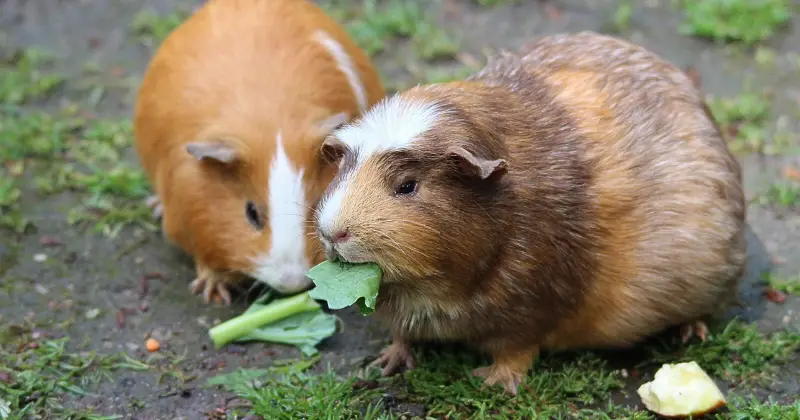
Feeding your guinea pig a varied and balanced diet is essential for their health and happiness. Although marigolds are safe for guinea pigs to eat in moderation, providing different food options can keep their diet interesting and nutritious. Let’s explore some alternatives to marigolds for your guinea pig’s diet.
Dandelions
Dandelions are a common flower that guinea pigs can enjoy. These yellow flowers, along with their roots, stems, and leaves, are safe for guinea pigs to eat, but only in moderation. Dandelion greens provide a good amount of fiber, which is essential for proper digestion. They also contain Vitamin C, an essential nutrient for guinea pigs, as they cannot produce it on their own.
Roses
Another alternative to marigolds is roses. Guinea pigs can eat rose blooms and leaves safely, as long as they’re pesticide-free. Including roses in your guinea pig’s diet can add variety and provide additional nutrients. Be sure to limit the number of roses you give as a snack, balancing them with other food items in their diet.
Fruit
Aside from flowers, fruit is another option as a treat for your guinea pig. Fresh fruit can be offered occasionally, considering its high sugar content. Some good fruit options for guinea pigs are apples (without seeds), blueberries, kiwi, and strawberries. When giving fruit, make sure to remove any seeds or pits, as they can be harmful.
All these alternatives should be offered occasionally, keeping in mind that the primary food source for your guinea pig should be high-quality hay, which provides essential fiber for their digestion. Moreover, guinea pigs require a constant supply of fresh water and high-quality pellets to fulfill their nutritional needs.
Potential Side Effects and Risks
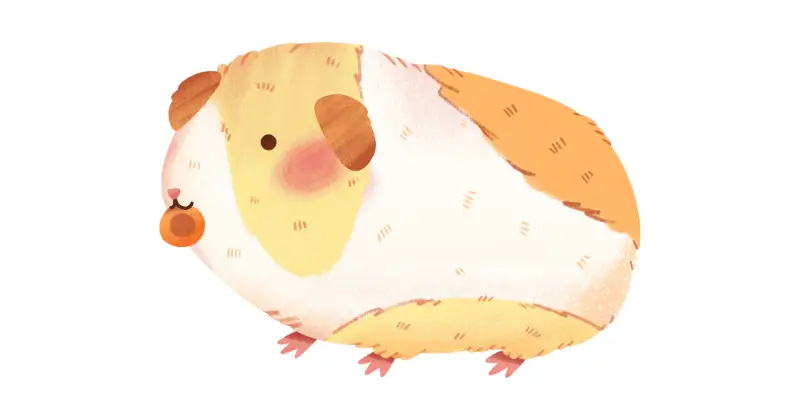
When it comes to feeding marigolds to guinea pigs, there are a few potential side effects and risks that you should be aware of. While marigolds can be a healthy addition to a guinea pig’s diet when given in moderation, they could cause some problems if fed too frequently or in large amounts. Let’s take a closer look at some of the side effects that may occur.
Digestive Issues
One of the most common issues that may arise from feeding marigolds to guinea pigs is digestive discomfort. Guinea pigs have a sensitive digestive system, and introducing new foods, especially in large quantities, may lead to issues such as bloating, upset stomach, and diarrhea.
To avoid these problems, it’s best to provide marigolds in small amounts and only occasionally. Always closely monitor your guinea pig after introducing a new food to ensure they don’t experience any adverse effects.
Allergies
Although it’s rare, some guinea pigs may have an allergic reaction to marigolds. This could manifest as skin irritations, discomfort, or even problems with their immune system. To minimize the risk of an allergic reaction, introduce marigolds gradually and in small quantities.
If you notice any signs of an allergic reaction, such as itching, redness, or swelling, it’s best to discontinue feeding marigolds to your guinea pig and consult a veterinarian.
In conclusion, marigolds can be a tasty and nutritious treat for guinea pigs when provided in moderation. However, it’s essential to be aware of the potential side effects and risks that may come with introducing any new food into your guinea pig’s diet. Keep an eye on your pet and adjust their diet accordingly to ensure they remain happy and healthy.
FAQ
How can I ensure the well-being and safety of my guinea pigs, including their environment, water, veterinary care, and seeking professional advice when needed?
In terms of the care and safety of guinea pigs, it’s important to provide them with a clean and suitable living environment, access to fresh water, and regular veterinary check-ups. If you suspect any health issues or observe unusual behaviors, it’s advisable to seek the advice of a professional, such as the nearest animal clinic specializing in small animals.
Conclusion: Can Guinea Pigs Eat Marigolds

In conclusion, while marigolds may be a favorite flower for many and are known for their fragrant and bold colors, they should not be considered as a regular part of a guinea pig’s diet. Although marigolds contain some beneficial compounds and nutrients like vitamin C, excessive amounts may lead to digestive upsets or upset stomach in guinea pigs.
It’s important to prioritize a varied diet of safe foods and consult with a veterinarian for guidance on meeting your guinea pig’s specific nutritional needs. Remember, the health and well-being of your furry friend should always be the top priority.
Ensuring an ample intake of vitamin C through their regular diet can help guinea pigs maintain healthy skin, ward off bug bites, and potentially reduce the risk of macular degeneration, making the inclusion of guinea pig marigolds a thoughtful choice.
Additionally, when it comes to addressing specific health issues in guinea pigs, such as dry skin or bug bites, it’s best to consult with a veterinarian for appropriate treatment options rather than relying on herbal medicines or supplements like marigolds. Marigolds may have some medicinal properties, but they are not a substitute for professional veterinary care.
Furthermore, while marigolds may offer certain health benefits, such as their antioxidant compounds and potential support for eye health, it’s essential to consider the overall dietary fiber and nutrient variety in a guinea pig’s diet. A wider variety of fresh food, along with a balanced and regulated intake of vitamin C, is crucial for their well-being.
Remember, while marigolds may be visually appealing and have their uses, it’s essential to prioritize the specific dietary and medical needs of guinea pigs to ensure their optimal health and happiness.



